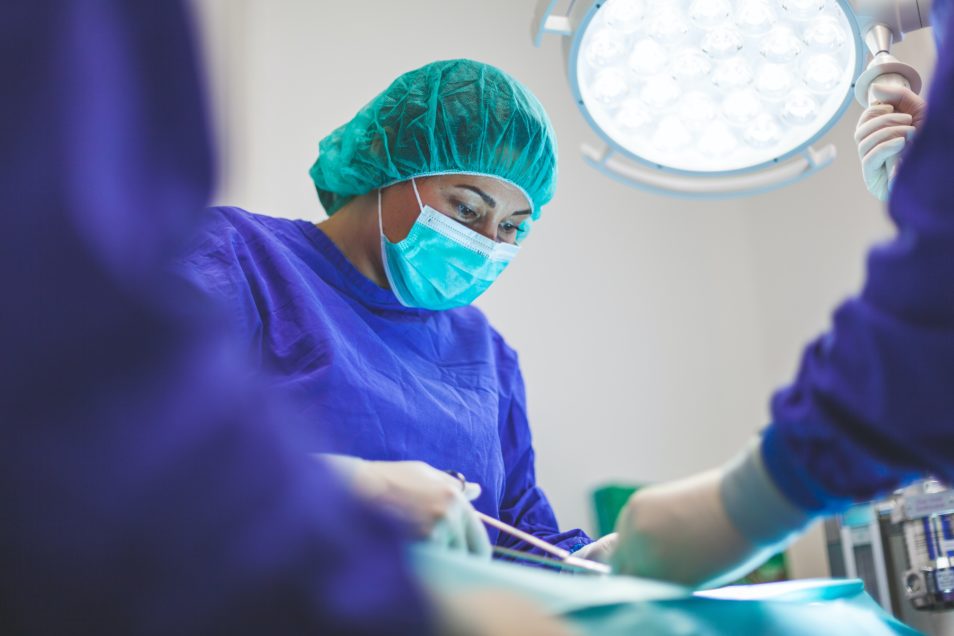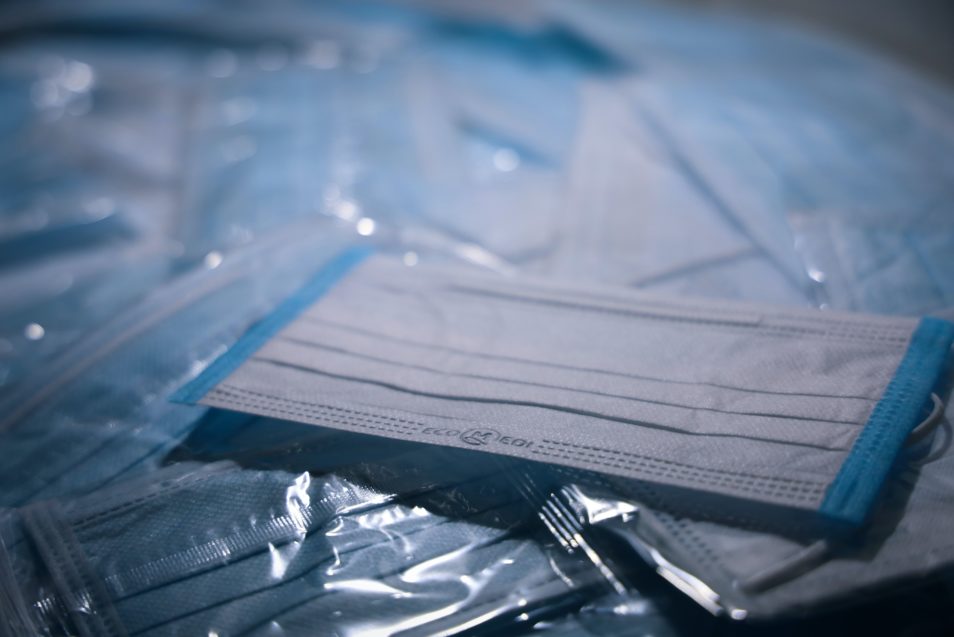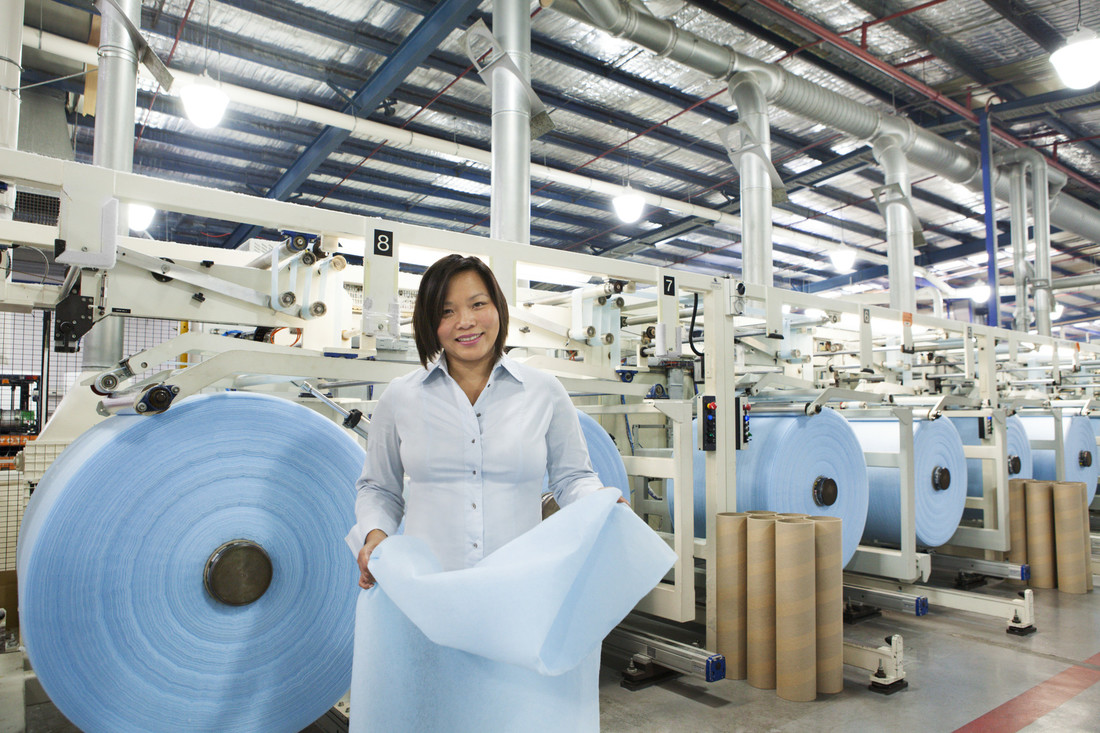
Surgical face masks have come to be the global symbol of COVID-19.
You will have seen the tired faces of front line doctors and nurses around the world, bruised from continual face mask wearing.
You’re probably also aware we have limited supplies for these front-line workers because so many other people are stocking up and there have been disruptions to the global supply chain.
More people have started wearing face masks here in Australia too. Staff at the local GP, shop keepers and the general public are all hoping they will fend off the virus.
But when is wearing a face mask actually beneficial? And with surging demand and broken global supply chains, how can we be sure we’ll have enough?
It’s important to understand when surgical face masks provide protection. And when they don’t. The Australian Department of Health says face masks are of most benefit to health care workers in frequent close contact with sick people. And to those who already have COVID-19. This is so they don’t cough on others and spread the disease.
How do surgical face masks work?
A surgical face mask protects those working closely with infected people from others’ coughs and sneezes. Coughs and sneezes send out droplets of bodily fluids that may contain germs or respiratory viruses. You can also wear a mask if you are sick to protect others from your bodily fluids.
Surgical masks are made from felt that is fine enough to filter out most small particles, including pathogens. To be effective you must wear them according to the manufacturers’ instructions. It’s important not to touch the mask until you remove it. They’re also single-use so you need to dispose of them after wear.

Face masks are in demand during the Covid-19 pandemic.
Addressing a global shortage
COVID-19 began impacting Australia in February 2020. Early on surgical face masks were identified as an important resource in the fight against the virus. By mid-March confirmed cases were rising and this caused a surge in global demand.
With a disrupted global supply chain, local manufacturers have been addressing shortages of medical equipment and the materials to make them. Manufacturing businesses responded quickly.
Local manufacturer Textor Technologies was one of these companies. It has been adapting its facilities to make the special filtration fabric suitable for supply to local companies that manufacture surgical face masks.
Using our Pilot-Scale Production Facility at Waurn Ponds, near Geelong in Victoria, Textor has been working to speed up development and manufacture of certain filtration fabric. We’ll test the performance of the fabric before it goes on to testing against Australian Standards. If successful, Textor may produce the material at commercial scale.
Local businesses to the rescue
Surgical mask manufacturer Med-Con will use suitable material to make the finished surgical masks. Until recently, this small company in country Victoria had been Australia’s only manufacturer of surgical masks.
Med-Con typically produces around two million masks per year out of its Shepparton facility. But as a result of COVID-19, the small business is now increasing its production by at least tenfold. This will mean introducing more machines to its factory and increasing its workforce to cope with the demand.
Our agile manufacturers are rising to the COVID-19 challenge. Businesses like Textor and Med-Con are trying to ensure Australia’s medical professionals are better equipped to treat patients with the virus.

We helped develop moisture-trapping fabric with Textor Technologies.
Designing 3D printed masks
In another Team Australia approach, we have been working with Flinders University, University of South Australia and Detmold to provide advice and equipment for a new mask testing facility in South Australia, which will test locally made respirators and surgical masks.
Our data and technology science specialists at Data61 are also using 3D printing to produce two designs of protective face shields for Queensland healthcare workers. While usually reserved for research purposes, we’re using nearly all our polymer 3D printers to print short runs of shield frames as part of a state-wide collaborative effort. We expect to be supplying 300 to 500 units this month. This contribution will ensure that Queensland healthcare workers have sufficient protective equipment available to meet current demands while Australian industry adapts to mass manufacture these kinds of items.
Further tips on face-mask wearing during COVID-19 can be found via the Australian Government’s Department of Health.


30th April 2020 at 5:37 pm
I’m looking into produce melt blown fabric(N95 level) in NSW, as it is very important part for making masks. Any regulations for this production and who can I contact? Thanks!
1st May 2020 at 3:51 pm
Hi Wade, thanks for your question.
We recommend businesses conduct their own research into manufacturing systems and encourage potential manufacturers to explore the necessary requirements for making respiratory protective products. Some useful references include:
• The Therapeutic Goods Australia website for information about the regulation of medical devices, and what is included in this category: https://www.tga.gov.au/manufacturing-medical-devices-covid-19-including-3-d-printing.
• The National Association of Testing Authorities (NATA) for information about accreditation in manufacture: https://www.nata.com.au
• Standards Australia: https://www.standards.org.au/getmedia/4d7449e3-ee13-4b54-8f01-4347638010e6/D_1588-Standards-and-COVID-19-(002).aspx
For more information on our research in Manufacturing, please visit: https://www.csiro.au/en/Research/MF
Kind regards,
Kashmi
Team CSIRO
27th April 2020 at 3:02 pm
I’m interested in setting up a PPE making facility in an industrial warehouse we own in Gold Coast. Who can we contact?
29th April 2020 at 8:39 am
Hi Siegfried,
Our focus is currently on face masks and not broader PPE. We recommend businesses conduct their own research into manufacturing systems and encourage potential manufacturers to explore the necessary requirements for making respiratory protective products. Some useful references include:
• The Therapeutic Goods Australia website for information about the regulation of medical devices, and what is included in this category: https://www.tga.gov.au/manufacturing-medical-devices-covid-19-including-3-d-printing.
• The National Association of Testing Authorities (NATA) for information about accreditation in manufacture: https://www.nata.com.au
• Standards Australia: https://www.standards.org.au/getmedia/4d7449e3-ee13-4b54-8f01-4347638010e6/D_1588-Standards-and-COVID-19-(002).aspx
For more information on our Manufacturing research, please visit this link: https://www.csiro.au/en/Research/MF
Kind regards,
Kashmi
Team CSIRO
24th April 2020 at 1:28 pm
This unfortunate outbreak should teach us that it is imperative that we have a reliable local source for essentials such as face masks, gloves and face shields ( I strongly agree Allan), we need to support and develop our local industries and find ways of doing things better. Cheaper or quality, or can we have both??
23rd April 2020 at 4:16 pm
well done yes we need to look at australian made products so that we have a base of products to fall back on when we are in need
23rd April 2020 at 3:21 pm
And when it is all over, Australian users will go back to buying from the cheapest sources, which will definitely not be Australian manufacturers..